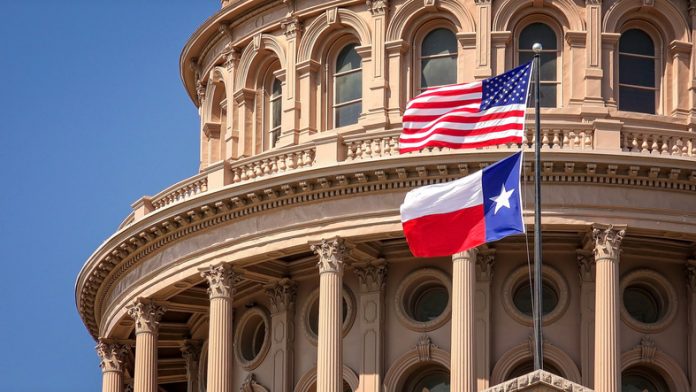Texas looking more like California, after legislators passed largest increases in spending, corporate welfare, and safety nets in state history. (Opinion)
By Vance Ginn
Texas’ 88th regular legislative session, sine die as of Memorial Day, will be remembered as the one that got Texas closer to looking like California and less like the leading pro-market and limited government Lone Star State.
Instead of the desired “largest property tax cut in Texas history,” school choice, and spending restraint that would best let people prosper, legislators passed the largest increases in spending, corporate welfare, and safety nets in state history.
Texas taxpayers can only hope that Gov. Greg Abbott’s (R) just-called special session will help with property tax relief but there will need to be more special sessions for universal school choice and other pro-prosperity priorities.
The newly passed total budget for the upcoming two-year period amounts to $321 billion, which is a 21.3% increase from what was initially appropriated in the prior period. Excluding federal funds, state funds increased by 31.7% to $219.1 billion. These are the largest increases in recent history and likely ever. And both are substantially above the rate of population growth plus inflation of 16% over the last two fiscal years.
In short, legislators passed massive budget increases which aren’t conservative or responsible and will make it difficult to sustain these expenditures over time. Making matters worse, the Legislature provides over $10 billion in new corporate welfare, the largest amount in state history.
This includes renewal of property tax abatements by school districts, HB 5, that had died in December 2022, money for the governor’s Texas Enterprise Fund, and subsidies for natural gas projects, movie production, broadband projects, water projects, state parks, and more.
And much of this will be on the ballot this November to create new funds to spend on these efforts, which voters should reject. Instead, these expenditures should be done in the normal budget process as constitutionally dedicating these taxpayer dollars will remove them from under the constitutional spending limit, allowing the state to spend even more.
Texans were quick to celebrate the movement toward new property tax relief efforts, which is a major burden for property owners across the state. And with a surplus of $33 billion, there was the opportunity to do so by rightfully returning these over collected taxes.
But those cuts never materialized in the wake of less effective solutions of appraisal caps and homestead exemptions taking precedence over the previously promised historial property tax cut.
The gold standard for relief of school district maintenance and operations property taxes is through compression, which means that the state uses mostly sales taxes to buy down those property tax rates and thus tax collections by the most possible. And the amount should be about $21 billion, or 25-cent compression, in inflation-adjusted dollars to have the same purchasing power today as what was the largest property tax cut of $14.2 billion in 2008.
This is a critical path to eliminating nearly half of the property tax burden in Texas so people can truly own their property instead of renting from the government forever.
Still, any relief provided is made much less effective with the passage of HB5, which is just Chapter 313 revamped.
HB5 gives more corporate welfare to big businesses by allowing school districts to give tax breaks to companies for new buildings, thereby choosing winners and losers among school districts affected. As school districts lose property tax funds at the hands of HB5, state funds must compensate for the loss on the backs of taxpayers across the state.
These big spending, big corporate welfare, and no tax relief represent a potential turning point in the wrong direction that harms a robust economy.
In the first called special session this week, there has already been a bill passed by the Texas House that would provide that opportunity by compressing school district M&O property taxes by 16.2 cents per $100 valuation with $12.4 billion. The Texas Senate has a proposal that would compress those taxes by 10 cents per $100 valuation and raise the homestead exemption by $60,000 to $100,0000 with $12.1 billion.
So far, Gov. Abbott has said that the call was only for compression but Lt. Gov. Dan Patrick (R) has been pushing back. At the end of the day, compression is best as it helps everyone, is long-lasting as a share of taxable value, and, more importantly, is the only way to eliminate these taxes.
But what’s still a problem is that these amounts are only about one-third of the $33 billion surplus, meaning the Legislature wants to spend more money than return to taxpayers. This is not the path to prosperity as at least $21 billion in new tax cuts is needed for this to be the largest property tax relief in Texas history.
Lawmakers should prioritize responsible relief measures that encourage job growth and support initiatives that promote long-term economic prosperity by reducing spending, cutting taxes, and supporting prosperity.
Vance Ginn, Ph.D., is founder and president of Ginn Economic Consulting, LLC, host of the Let People Prosper podcast, and chief economist or senior fellow at multiple think tanks across the country. He previously served as the associate director for economic policy of the White House’s Office of Management and Budget, 2019-20. Join the thousands who follow him on Twitter for daily, insightful commentary @VanceGinn.
Originally published by The Center Square. Republished with permission.
For more great content from Budget & Tax News.











